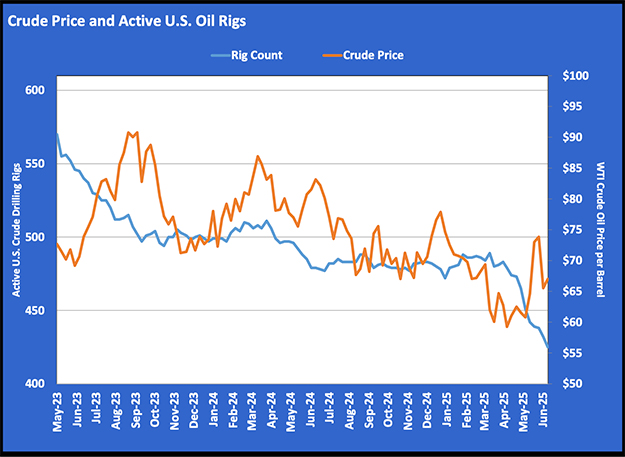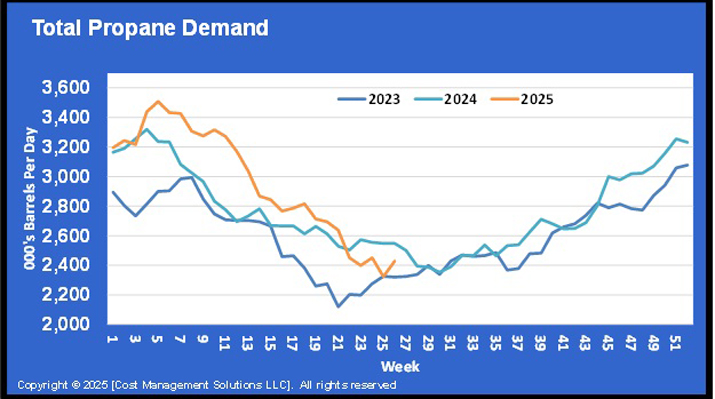How to exploit opportunities in the propane swap market
In last week’s Trader’s Corner, we explored establishing a buying criterion for this coming winter. Based on higher crude prices, lower propane inventory and other factors, we decided that buying at, below or near last year’s winter price average was a reasonable buying criterion.
During the winter months of October 2020 through March 2021, Mont Belvieu (MB) LST propane averaged 73.74 cents per gallon. During the same period, Conway propane averaged 73.57 cents. So, again, based on our assessment of current conditions, establishing at least some price protection for next winter around those values appears to be an opportunity.
The market is basically providing that opportunity now. MB LST is currently priced at around 75 cents for the winter of 2021-22. Conway is about 77 cents for that period.
If you want to look further out, October 2022 through March 2023 propane is around 62.5 cents for MB LST and 65.5 cents Conway. October 2023 through March 2024 is pricing at 58 cents MB LST and 60.5 cents Conway. If you agree with the buying criterion, you may be ready to capture the opportunity you believe the market is presenting.
You may have several ways of capturing the opportunity. Pre-buys from suppliers are a common practice. That is an excellent option for at least a portion of your price protection. The most significant advantage of a traditional pre-buy is that the supplier usually allows the volume to be pulled over the entire winter. If you do a ratable pre-buy, where a specific volume is pulled each month, then the advantage is significantly less.
However, our suppliers may not be ready, willing or able to offer pre-buys when the market provides the opportunity. Or the retailer may want the flexibility of getting out of the position if the outlook for the market changes, in which case financial hedges can be used.
For the next couple of weeks, we are going to explore how to use a financial tool to provide the same price protection as a pre-buy. We will also look at some of the advantages of financial tools in price risk management. Cost Management Solutions (CMS) provides a lot of help to readers and clients that want to use these financial tools as part of their price risk management program.
The first, and perhaps most important, thing to understand about financial hedging is that it works in tandem with and does not change or replace the normal process that a retailer uses to buy propane and get it into their tanks. If a retailer buys transport loads of propane from suppliers X and Y, he will continue to do the same. Later, we will recommend one way to buy from your suppliers that works best with financial hedging tools, but, other than that, the process of getting propane into your bulk tank does not change.
If retailers do not pre-buy or enter a financial hedge in advance, is there any way of knowing what the price will be from October 2021 to March 2022? It’s a huge unknown, and most retailers would both desire and benefit from turning that unknown into a known. Let’s look at how to use a very simple financial tool called a swap to turn that unknown into a known.
There are propane producers right now that, like the retailers, have no idea what they will get for the propane they produce from October 2021 to March 2022. They would like to change that unknown into a known, too. This is the essence of the swap market. There are sellers of propane and buyers of propane that both desire knowing what they will receive or what they will pay for propane in the future. The swap market exists to establish a future value of propane so that buyers and sellers can come together to establish the value of the propane they produce or sell in the future.
It is important to understand that the counterparties in a swap agreement aren’t required to have a supply relationship. So, a retailer that has a relationship with companies X and Y to supply physical propane will likely have financial hedges with other entities. In fact, the retailers and producers won’t even know they are countering each other’s positions because there are almost always intermediaries or trading companies between the two parties.
Trading companies have relationships with both producers of propane and consumers of propane, such as propane retailers and petrochemical companies. In a simplified version of the process, multiple producers let the trader know how much of their propane production for, say, October 2021 to March 2022 they would like to sell in advance and what they are willing to accept. They are “offering” their future propane production for sale now.
CMS has relationships with a large number of propane retailers. We help our clients and readers establish relationships with trading companies, and then we represent our clients in negotiations with the traders.
Our clients will let us know that they wish to lock in a specific volume of propane for specific months. They may give us a specific price they are willing to pay. When they do that, they are “bidding” on the propane. More frequently, our clients will call to get offers from traders, and if the price matches the clients’ buying goals and criteria, they will accept the offer.
In summary, intermediaries bring propane buyers/consumers and propane sellers/producers together to negotiate a fair value of propane in the future. Those parties enter a contract, known as a swap, where one agrees to sell, and the other agrees to buy propane at a specific price, and at a specific volume, during a specific future period. The financial swap is not an agreement to exchange physical, wet barrels of propane. It is an agreement to exchange value so that each party will ultimately buy at or sell at the price agreed to in advance. To make this happen, the parties exchange checks to complete the agreement. Thus, it is a financial swap rather than a supply contract.
With this background about how the financial hedging market or, more simply, the propane swap market works, we will explain next week how the swap and physical buying of propane work in concert to give the propane retailer a known cost of supply in the future.
Call Cost Management Solutions today for more information about how client services can enhance your business at 888-441-3338 or drop us an email at info@propanecost.com.
















